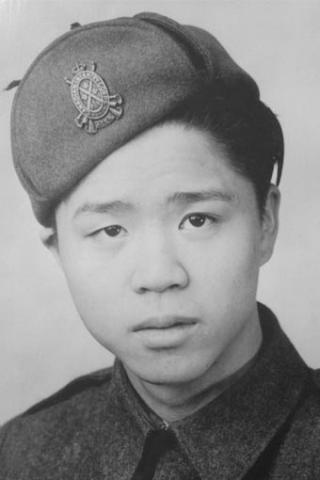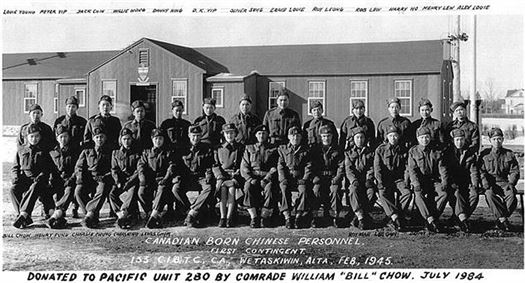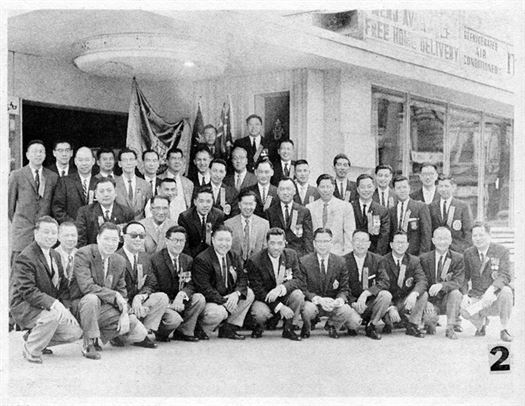
Alex Louie
Eighteen year old Alex Louie toiled in a BC pulp mill before he volunteered for active service and was trained in India to parachute behind enemy lines as part of British Army initiatives.
Vancouver, British Columbia
Video
HTML5 Transcript/Captions
[Ramona Mar (Interviewer)] In the 1930's there were no dreams of a better life for Alex Louie.
His teen years were spent unhappily in a BC pulp mill.
[Alex Louie (Interviewee)] It's very bleak, I don't know I don't know how to describe it but the times were such a
disappointment, you don't know your future; you don't know what's going to happen tomorrow ...
and you're going like this every day, what are you going to do? There's really, there's no future.
[Ramona] So you didn't even dare dream of what you could do.
[Alex] You can't dream, there's nothing you can do. You have no money, you have no education
and if you do have education you can't find a job. A lot of people finish
high school, people finish university here, they can't get jobs, you know some of my friends
you know. So, so we worked there until I got drafted into the army.
[Ramona] Alex, what did you think when you received that draft notice to go to war?
When you're 20 years old, you're you're an adult, when you're 18 you're still wet behind the ears you know so, we just follow, actually
we just follow what the older people do. I was just following the herd, I was too young then to
know much; I don't know anything about politics.
A lot of people think volunteer is just you volunteer to go in, but it wasn't. Volunteer,
the word volunteer means that you could either go signed active which you, which they can send
you anywhere, or you can stay as a home guard; you stay home. If you volunteer for
active service, we get an emblem on our sleeve which shows with the word "G" in
it and shows, and we don't want to wear the uniform without this...
[Ramona] I think that...
[Alex] ... And we all felt the same way because if you're going to wear a uniform, you might as
well let the people know, especially white people. You've got to let them know
that you know we're, hey we're gung-ho, we're in there, right?
[Ramona] How did you feel when you put on that uniform for the first time?
[Alex] Oh, it was something that I just, words are pretty hard to
describe it. When you're being discriminated and then when you wear a uniform you've, I, and
you felt equal. You felt, you know, you felt equal, hey nobody better than I am now anymore right?
[Ramona] Alex was sent for basic training in Westaskwin, Alberta. By the time he'd finished, the
Japanese occupation of SE Asia meant that Chinese-Canadian participation was actually
being sought after. Alex found himself on a mission that took him to India. The goal
was to go behind enemy lines in the Asian theatre with the British Force 136.
[Alex] So, they needed people like us be able to, that were bilingual, uh and we can arrange for guerrillas.
Our job is to either go by submarine or we got parachuted behind enemy line. We
were trained to be demolition uh people and morse code, we're supposed to contact
one another you know so that they'd know where we are. And we we're supposed to while
the British attack in the front we were, we were engaging with the guerillas. So so
when the Japanese retreated, you know, they can't retreat because we got the guerilla under our under our instructions.
[Ramona] The training time in India must have been one of intense anxiety and almost fear
for you, and then at the same time you also had a good time because you were with your buddies!
[Alex] Well actually you don't know any better;
you go anyway, you go with the group right? But my 2 uncles parachuted when I went
in there, and uh there were 2 good friend of mine, uh Poon Wong and Larry Wong and his brother Ted.
When I got in there got into, the first person I meet was my good
friend Poon; uh he died since. He says, "What are you doing here?" He said, "war
may not end for another 5 years". I said "Holy Mackerel, I didn't realize that". And then
believe it or not then I went back, I start praying; I'm not a religious person. I'm not, I
have no religion really, but I think people do pray I guess when they're in trouble or they think they're in trouble.
[Ramona] So you never had to do any battle, you never had to parachute into enemy territory
because the war ended before you were supposed to go?
[Alex] I think we consider ourself either lucky or what whatever it was. Uh if they would have
drafted, if we were Canadians and we were drafted earlier there'd be a lot of casualties; a
lot of us wouldn't have come back. As a result as only a couple dozen, maybe two,
three of dozens that went to the front; not that many of us.
[Ramona] As it turned out, the war for Alex, was a bit of an equalizer. Back in post-war Vancouver,
Alex would eventually become a successful restaurant nightclub
operator, opening Chinatown's first smorgasbord, a venture that would have been
unthought of in his pulp mill days. A natural impresario, Alex regularly brought home
acts from Los Angeles and Las Vegas to his Marco Polo Theatre Restaurant. The days of grinding poverty,
discrimination and war are long behind him and for Alex Louie, life is ... rosy.
[Alex] I just can't think of a better life now; I mean I'm just, I'm contented and see all my
grandchildren grow up. I don't I don't think, I don't think any anybody's life can be more
happy than my life now. I'm very very very contented and happy here.

Alex Louie at Wetaskiwin in 1945 (back row, far right).

Alex Louie in the group shot of the Chinese Canadian Veterans' 14th Anniversary
Where they participated
Photo of Alex Louie courtesy of the Chinese Canadian Military Museum
